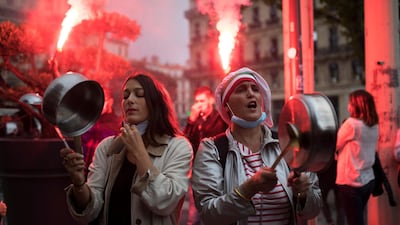President Emmanuel Macron on Wednesday ordered a night-time curfew for Paris and eight other French cities to contain the spread of Covid-19 after daily new infection rates reached record levels.
Mr Macron said residents of those cities, which are home to almost a third of the French population, would not be allowed outdoors between 9pm and 6am from Saturday, for at least four weeks, except for essential reasons.
"We have to act. We need to put a brake on the spread of the virus," he said.
People would no longer be able to visit restaurants and private homes in the late evening and night, Mr Macron said.
"We are going to have to deal with this virus until at least the summer of 2021," he said, adding that "all scientists" agreed on that point.
He said new daily coronavirus cases must be brought down to "3,000 or 5,000" from current levels, which have reached almost 27,000.
Curfews will apply in Paris and its region, Grenoble, Lille, Lyon, Marseille, Montpellier, Rouen, Saint-Etienne and Toulouse, Mr Macron said.
That meant about 20 million people would be affected from a total population of 67 million.
"We won't be leaving the restaurant after 9pm," Mr Macron said.
"We won't be partying with friends because we know that that's where the contamination risk is greatest."
He acknowledged that the curfew would be hard on young people but said the health crisis left little choice.
"It's hard to be 20 in 2020," Mr Macron said.
He urged people to limit gatherings in their homes to six people, and to wear protective masks.
Anyone found outdoors without authorisation during the curfew would face a fine of €135 ($159), and more than 10 times that for repeat offenders, Mr Macron said.
The French hospitality sector immediately complained about the curfews, calling them "a closure in disguise" for restaurants, cafes and hotels in a joint statement from their federations.
"We are in a worrying situation," Mr Macron said.
He insisted France had not "lost control" of the virus and a second full lockdown, like the two-month measure this year, would be "disproportionate".
Mr Macron said 32 per cent of France's 5,000 intensive care beds were occupied by coronavirus patients, and that had to be brought down to "10 to 15 per cent at most".
The latest official figures show 1,633 people are in intensive care in France. About 33,000 people have died from the coronavirus in the country.
Mr Macron said France would soon adopt a new screening strategy that could include self-testing, which would allow a "drastic" reduction in the wait for a result.
He said the much-heralded French phone app StopCovid "had not worked" and had been downloaded much less than similar apps used by France's neighbours.
He said a new app would be presented this month.
Earlier on Wednesday, the French government reimposed a national state of health emergency to allow "measures proportional to the health risks to be taken".
France was facing "a health catastrophe", the minutes from a Cabinet meeting said.
The state of health emergency is a legal framework allowing the government to take strict measures to fight the pandemic and needed to be renewed after it expired in July.






















